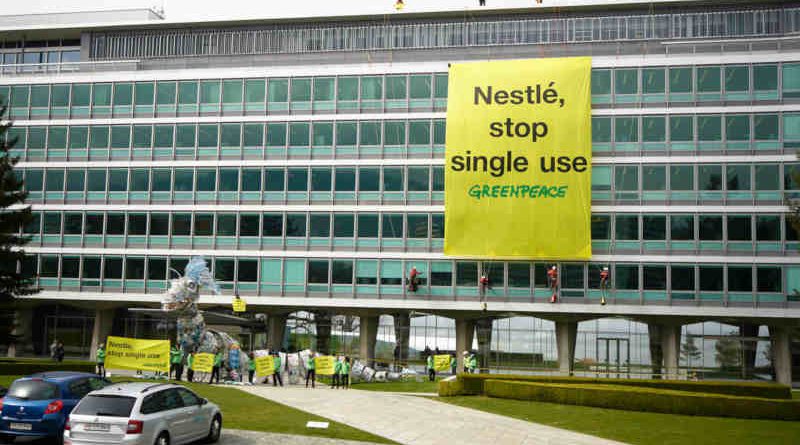Greenpeace Urges Nestlé to Reduce Plastic Packaging

Greenpeace Switzerland said on April 16 that its activists delivered a 20-meter-long “plastic monster” partly covered with Nestlé branded plastic packaging to the company’s headquarters in Vevey, calling on the corporation to end its reliance on single-use plastic.
Activists also held protests at Nestlé offices in the Philippines, Germany, Kenya, Slovenia, and its sub-brand San Pellegrino in Italy as part of a global day of action led by Greenpeace and allies from the Break Free From Plastic movement.
In response to the day of action against Nestlé, Global Plastics Project Leader Graham Forbes said, “Last year, Nestlé produced a shocking 1.7 million tonnes of plastic packaging – over 300 garbage trucks worth a day – a 13% increase from the year before. It is totally irresponsible that Nestlé produces hundreds of billions of plastic items every year that are used for a few seconds and then left to contaminate our communities, food chains, and ecosystems for generations.”
[ Read and Download: Clean Climate Environment News Magazine ]
From Manila to Rotterdam, and along the Rhine with a “plastic monster” to Nestlé’s headquarters in Switzerland, global environment protection organization Greenpeace has been raising awareness about the plastic production crisis in towns and villages across the globe.
In its response that Greenpeace published on April 15, Nestlé said, “Tackling plastic pollution, especially in our oceans, is an urgent priority for us. We take this responsibility seriously. We support all efforts to raise awareness and find solutions to the plastic waste problem.”
[ Lethal Pollution Killing People in Delhi ]
Greenpeace is demanding that fast-moving consumer goods companies (FMCGs) like Nestlé, Unilever, Coca-Cola, PepsiCo, Danone, Johnson & Johnson, and Mars be transparent and active in their immediate reduction in the production of plastic packaging while investing in the alternative delivery system of refill and reuse.
To date, according to Greenpeace, over 3 million people from around the world have signed a petition calling on brands to take action.
💛 Support Independent Journalism
If you find RMN News useful, please consider supporting us.




